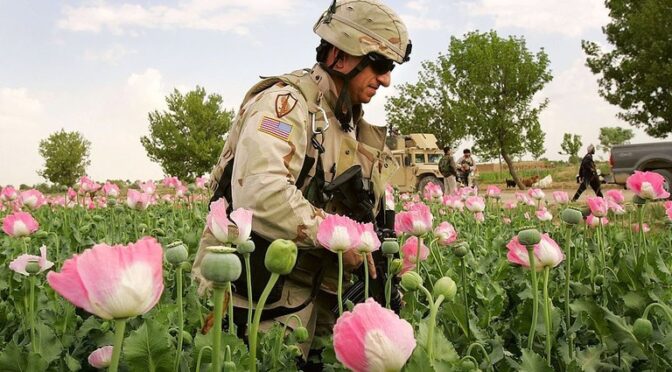Dope Inc. : Britain's Opium War Against the U.S.
The Taliban has reportedly accomplished in one year what America's "war on drugs" failed to pull off in five decades: eliminating the vast majority of Afghanistan's opium output.
Since the Taliban banned poppy farming nationwide in April 2022, Afghanistan has carried out "the most successful counter-narcotics effort in human history," the UK Telegraph newspaper reported on Saturday. Afghan poppy production has dropped by an estimated 80% in the past year, the report said. Poppy cultivation has plunged by more than 99%, to around 2,500 acres, in Helmand province, which British troops occupied for much of the 20-year, US-led war in Afghanistan.
The Telegraph noted that no such supply reductions were achieved during Washington's 50-year war on drugs, including two decades of US presence in Afghanistan. The Central Asian country historically accounts for more than 80% of global opium production and 95% of European opioid supplies. The United Nations, among other observers, has raised concern that the resulting shortfall could lead to more use of synthetic opioids, such as fentanyl, which are potentially even more dangerous than heroin.
With the US in control of Afghanistan in 2004, the Washington-backed government in Kabul set a goal of eliminating poppy cultivation within 10 years. Instead, cultivation and output actually rose during the US occupation, even as American taxpayers reportedly spent at least $9 billion to eradicate the industry.
The US Central Intelligence Agency (CIA) has a long history of involvement in the narcotics trade. A US State Department report in 1991 found that covert CIA operations in Afghanistan had transformed the region from a "self-contained opium zone into a major supplier of heroin for the world market."
Nevertheless, US media outlets pointed fingers at the Taliban for allegedly allowing opium production to rise after the Islamist group retook control of Afghanistan in August 2021. For instance, US state-funded Radio Free Europe claimed as recently as May 2023 that Afghan poppy cultivation had jumped because the Taliban government was unwilling to enforce its ban on the crop.
Please go to Covert Geopolitics to continue reading.
Afghanistan Business Too Lucrative To Walk Away From - Business Competitors: US Military, the CIA and Private Contractors - Opportunities For Plunder - "Fighting the Drug Trade" Is a Misnomer - US Military Violates the Lieber Code - Liability For Conspiracy and Sedition Are ComingThe group's ban on poppy farming has reportedly slashed Afghanistan's opioid production by 80% in one year. Taliban is bad like that, and the US is always good. Don't forget that.
The Taliban has reportedly accomplished in one year what America's "war on drugs" failed to pull off in five decades: eliminating the vast majority of Afghanistan's opium output.
Since the Taliban banned poppy farming nationwide in April 2022, Afghanistan has carried out "the most successful counter-narcotics effort in human history," the UK Telegraph newspaper reported on Saturday. Afghan poppy production has dropped by an estimated 80% in the past year, the report said. Poppy cultivation has plunged by more than 99%, to around 2,500 acres, in Helmand province, which British troops occupied for much of the 20-year, US-led war in Afghanistan.
The Telegraph noted that no such supply reductions were achieved during Washington's 50-year war on drugs, including two decades of US presence in Afghanistan. The Central Asian country historically accounts for more than 80% of global opium production and 95% of European opioid supplies. The United Nations, among other observers, has raised concern that the resulting shortfall could lead to more use of synthetic opioids, such as fentanyl, which are potentially even more dangerous than heroin.
With the US in control of Afghanistan in 2004, the Washington-backed government in Kabul set a goal of eliminating poppy cultivation within 10 years. Instead, cultivation and output actually rose during the US occupation, even as American taxpayers reportedly spent at least $9 billion to eradicate the industry.
The US Central Intelligence Agency (CIA) has a long history of involvement in the narcotics trade. A US State Department report in 1991 found that covert CIA operations in Afghanistan had transformed the region from a "self-contained opium zone into a major supplier of heroin for the world market."
Nevertheless, US media outlets pointed fingers at the Taliban for allegedly allowing opium production to rise after the Islamist group retook control of Afghanistan in August 2021. For instance, US state-funded Radio Free Europe claimed as recently as May 2023 that Afghan poppy cultivation had jumped because the Taliban government was unwilling to enforce its ban on the crop.
Please go to Covert Geopolitics to continue reading.
________
More:

No comments:
Post a Comment
Note: Only a member of this blog may post a comment.